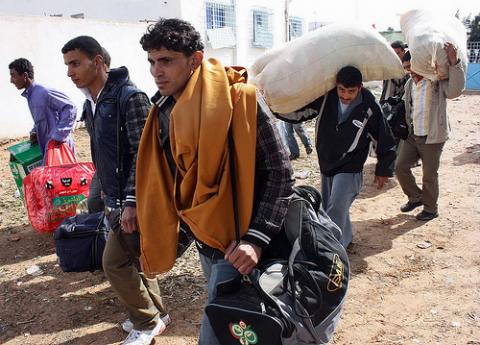Free movement under threat?

The threat to the Schengen system has been contained, for now. By Cian Murphy.
The headline item for yesterday's (12 May) meeting of EU justice ministers was the “Southern Neighbourhood Region”. This is a somewhat euphemistic reference to the the Europe’s poor response in the face of asylum seekers fleeing Libya. Last week the threatened reintroduction of border checks to prevent asylum seekers travelling from Italy to France prompted a communication from the European Commission. Earlier this week Britain, which is not part of the Schengen travel area, stated it would not accept any of those seeking asylum from the conflict. Yesterday, Denmark joined France in moving to reinstate border controls. It is likely therefore that the Commission communication, and the issues it sought to address, were vigorously debated at today’s meeting. Media reports are already emerging on who said what to whom. However, the central outcome – as it appears in the provisional press release - is the endorsement of the Commission’s position that an EU approach must be taken rather than ad hoc action by Member States.
Ministers, we are told, “expressed their unanimous position that the free movement of persons is one of the main achievements of the European acquis and that it must be preserved”. The Council was also unanimous in calling for reinforced external borders and increased co-operation with third countries. The co-operation should “build on both mobility and security aspects”. In addition the ministers “reiterated their commitment to establish a Common European Asylum System (CEAS) by 2012″. The document then makes a rather oblique reference to the “situation in the Southern neighbourhood and its migratory consequences”. This is described as a cause of “common concern”. The Commission has been asked to present “proposals for a comprehensive approach to migration” to be endorsed by the Council on 24 June 2011. The Council then draw attention to certain aspects of the Commission’s communication, including strengthened border controls; the CEAS; “better targeted legal migration”; exchange of best practice on integration and “a strategic approach” for dealing with third countries. A more direct reference is then made to the “migration situation in North Africa” and in particular to Libya, Tunisia and Egypt although there is no discussion of any further action. It has since emerged that Ireland will resettle 24 asylum seekers from the region.
While the Council was unanimous in endorsing the importance of free movement there were also few voices of dissent from the Commission’s plan to develop a mechanism to allow temporary border controls in situations of emergency. One report suggests that Belgium, Malta and Spain “expressed reservations” while Cyprus was the only “vocal opponent”. Fifteen of the 27 Member States are said to have “backed the proposal”. The Commission’s action was a swift response to the threat of unlateral action by the Member States. It is clear why. Commission President, Jose Manuel Barrosso, is quoted as saying that an end to the Schengen system “would catastrophically undermine not just what Europe has constructed over the last 61 years, but sabotage the viability of our efforts to build a prosperous and integrated Europe for the future”.
The press release describes the next steps as including “various Commission initiatives and proposals” as well as another meeting of Justice Ministers in June.The formal Commission proposals will merit close scrutiny. Factors to be considered include: whether Member States will be able to automatically trigger the emergency system or whether some form of permission will be required; from whom that permission will have to be sought; and what sort of mechanism there is for deciding whether or not to grant it. The Commission is likely to set the bar high but Member States who seek to use the mechanism will not want to set it so high as to make it impossible to clear. The perceived threat to the Schengen system has been contained for now. The humanitarian crisis that prompted it continues.
Originally published on Human Rights in Ireland.
Image top Magharebia.
